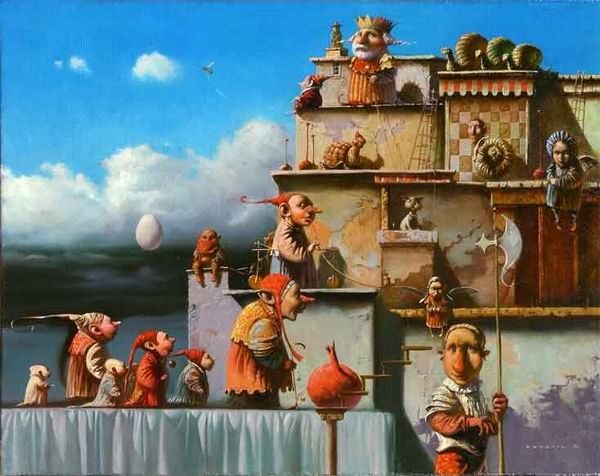
Ever Thought of Bach's Counterpunkt in Chess and Poker?
Counterpunkt (or counterpoint), refers to the art of combining two or more independent melodic lines in a musical composition. These lines are harmonically interdependent yet maintain their own rhythm and melodic contour. Kontrapunkt is a foundational aspect of Western classical music.
Each voice in a counterpoint composition can be seen as a participant in a conversation, where each melody has its own "voice" or argument, interacting with others. Just like in a dialogue, there's a back-and-forth, with each line responding to or complementing the others.
Counterpoint often involves contrasting elements - different rhythms, melodic shapes, or even emotional tones. These contrasts can create a sense of tension or opposition, much like how opposing ideas in a conversation might clash or challenge each other, leading to a richer, more dynamic musical texture.
A fugue (Latin fuga, "flight," "escape," think "fugitive") is a contrapuntal, polyphonic compositional technique in two or more voices.
Meet this thrilling fugue by Johann Sebastian Bach...
.
CONTRAPUNKT IN LITERATURE
The way the Russian novelist Fyodor Dostoevsky constructed moral dilemmas and contrasting worldviews for the characters in his novels can be likened to a form of literary counterpoint, producing profound and complex narratives much like music or chess (huh, chess? — read on)

Dostoevsky's characters often embody different philosophical, moral, or ideological perspectives. For instance, in "Crime and Punishment," Raskolnikov's utilitarianism clashes with the moral absolutism of others like Sonya or Porfiry Petrovich. This interaction of ideas can be seen as a counterpoint where each character's "voice" or viewpoint engages with others, creating a rich tapestry of thought.
Applied to the Dostoevsky's novels, polyphony of his heroes' voices can only mean the same as “counterpoint,” or “plurality of voices,” or “dramaticity.”

.
And the counterpoint story goes on, and on.
What about poker?
CONTRAPUNKT IN POKER
Each player at the poker table can be seen as a distinct voice, with their own style, strategy, and psychological approach. Just like in music where each instrument or voice carries its melody or theme, in poker, each player brings their unique set of tells, bluffing techniques, and betting patterns.
The entire poker table can be viewed as an orchestra, where each player's contribution, whether through action or inaction, contributes to the overall narrative or 'symphony' of the game.
The poker mention here is a tribute to WGM Jennifer Shahade @JenShahade, a fascinating figure whose accomplishments in both chess and poker reveal distinct yet interconnected playing styles, shaped by her strategic mind and competitive spirit. She's two-time US Women's Chess Champion. In 2014 was she the winner of the first TonyBet Open Face Chinese Poker Live World Championship High Roller Event, taking home €100,000.
There’s a clear thread between her chess and poker styles: a preference for active, decisive play tempered by strategic depth. In chess, she leverages her tactical vision to dictate the game’s flow; in poker, she uses adaptability and opponent analysis to exploit edges. Her chess-honed discipline translates into poker’s focus on preparation and range construction, while poker’s social dynamics enhance her ability to handle chess’s psychological battles. She’s even noted how poker’s glamour and chess’s intensity are converging, suggesting her styles evolve with her dual expertise.

.
CONTRAPUNKT IN CHESS
The game of chess can also be seen as a form of counterpoint or a dialogue of opposing forces, producing beautiful and artistic outcomes.
Like in counterpoint where melodies interact, chess involves two players with opposing goals using different pieces with unique movements and strategies. Each move by one player responds to, anticipates, or challenges the moves of the other.
Chess games can be seen as a conversation, or strategic dialogue, where every move is a statement, counter-statement, or a question posed by one player to the other. Each player must consider not only their own strategy but also predict and react to the opponent's moves, creating a dynamic interplay much like the melodies in music.
In chess, the beauty of the game often emerges from the complexity and elegance of the moves, much like the beauty in music arises from the interplay of melodies. Brilliant chess games are admired for their creativity, depth, and sometimes for their simplicity or unexpected turns, akin to appreciating a well-composed piece of music.
Chess games, like musical compositions, can be analyzed, appreciated, and remembered for their artistic qualities. Certain moves or entire games can be celebrated for their innovation, tactical beauty, or strategic depth, contributing to the lore and art of chess.
Considering chess as a form of counterpoint or a dialogue of opposing forces not only highlights its strategic depth but also elevates the game to an art form where beauty emerges from conflict and strategic interaction.
Here's a beautiful game exemplifying the art of counterpoint in chess. Watch how the players jump on each other using fearless and beautiful contrapuntal strokes (commentary @SamCopeland, the Canceler, who as the chess.com Head of Community and Director of Content is even responsible for practicing the cancel culture on the site; he has dropped me from the top-bloggers team - not once, but TWICE, thus putting me on the bench; it really doesn't matter to him the chess.com members and those who come visiting the site for its blog section have been denied of some quite unique and original chess content they cannot find anywhere in the chess blogosphere — well, as a free agent, perhaps should I seek a transfer🤣)
Hope you enjoyed the contrapuntal connection of music, literature, poker and chess. Starring Bach, Dostoevsky, Shahade, Chucky and Yusupov.
You y'all take care!
Greetings from the (Deep) South!![]()
.
.

